Of sewage spills and citizen suits
New Berkeley Law report examines citizen actions addressing sanitary sewer overflows in California
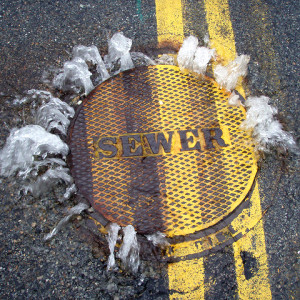
(This post is co-authored with Nell Green Nylen and Michael Kiparsky.)
Every day, Californians produce millions of gallons of wastewater. We tend to avoid thinking about what flows down our drains, but how we deal with sewage is a critically important aspect of public and environmental health. Most communities in California rely on an extensive system of interconnected pipes to collect wastewater and deliver it to a treatment plant. There, treatment reduces pollutants to acceptable levels before the wastewater is discharged. However, sometimes, wastewater escapes from the collection system before it reaches the treatment facility, resulting in a sanitary sewer overflow (SSO). Although most SSOs can be prevented through good maintenance and management practices, some are likely to occur even in well-managed systems.
SSOs may violate federal and state law. The federal Clean Water Act (CWA) and the permits it requires prohibit many SSOs. Since 2006, California has also specifically regulated SSOs at the state level, requiring collection system agencies to engage in sewer system management planning and report all SSOs to a publicly accessible online database (“SSO database”). This unique database facilitates tracking of statewide-, regional-, and agency-level SSO trends and helps regulators and potential citizen plaintiffs identify potential enforcement targets.
While government authorities are generally responsible for enforcement of the law, the CWA’s citizen suit provision allows private individuals or groups to address gaps in government enforcement.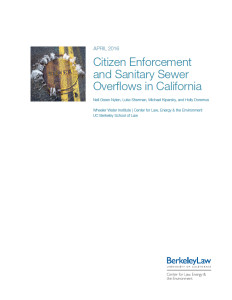
A new report from the Wheeler Water Institute at Berkeley Law’s Center for Law, Energy & the Environment (CLEE), Citizen Enforcement and Sanitary Sewer Overflows in California, examines the nature and impacts of SSO-related citizen enforcement actions initiated under the CWA’s citizen suit provision. To our knowledge, this is the first in-depth attempt to evaluate the effectiveness of citizen enforcement in achieving compliance with and furthering the goals of the CWA.
Differing views of citizen enforcement
Our project was motivated by the sometimes widely divergent perceptions of citizen enforcement held by collection system agencies and environmental groups. Theoretically, a citizen plaintiff could win a lawsuit against a collection system agency based on a single, small SSO reaching waters of the United States.
Collection system agencies suggest that strict liability for discharges that violate the CWA, California’s easily accessible SSO database, and the availability of attorneys’ fees to prevailing plaintiffs combine to create the potential for citizen enforcement activity motivated primarily by the prospect of financial gain. They argue that the benefits of citizen enforcement often do not outweigh its burdens: for example, agencies may already be doing things required by settlement agreements; or settlements may force agencies to use specific, not necessarily efficient, methods to achieve particular goals.
On the other hand, environmental groups see citizen enforcement as crucial to addressing collection system management issues that threaten water quality, ecosystems, and public health. They argue that state and federal regulators are overwhelmed, juggling many different priorities, and don’t always identify or fully address problem collection systems due to bandwidth constraints or political pressures to avoid overburdening fellow public agencies. They contend that most settlement agreement provisions involve new commitments, but that even those that require collection system agencies to implement existing policies and procedures are beneficial because they impose new consequences for failure to follow through.
Methods
This controversy motivated us to design a project that moves past anecdotal evidence. To that end, we collected and analyzed publicly available data about SSO-related citizen enforcement activity in California between 1996 and mid-2015. This data included information about the citizen actions themselves, about potentially overlapping government enforcement actions, and about collection system performance over time.
Major findings
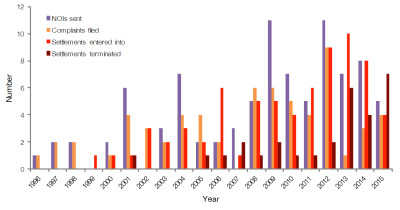
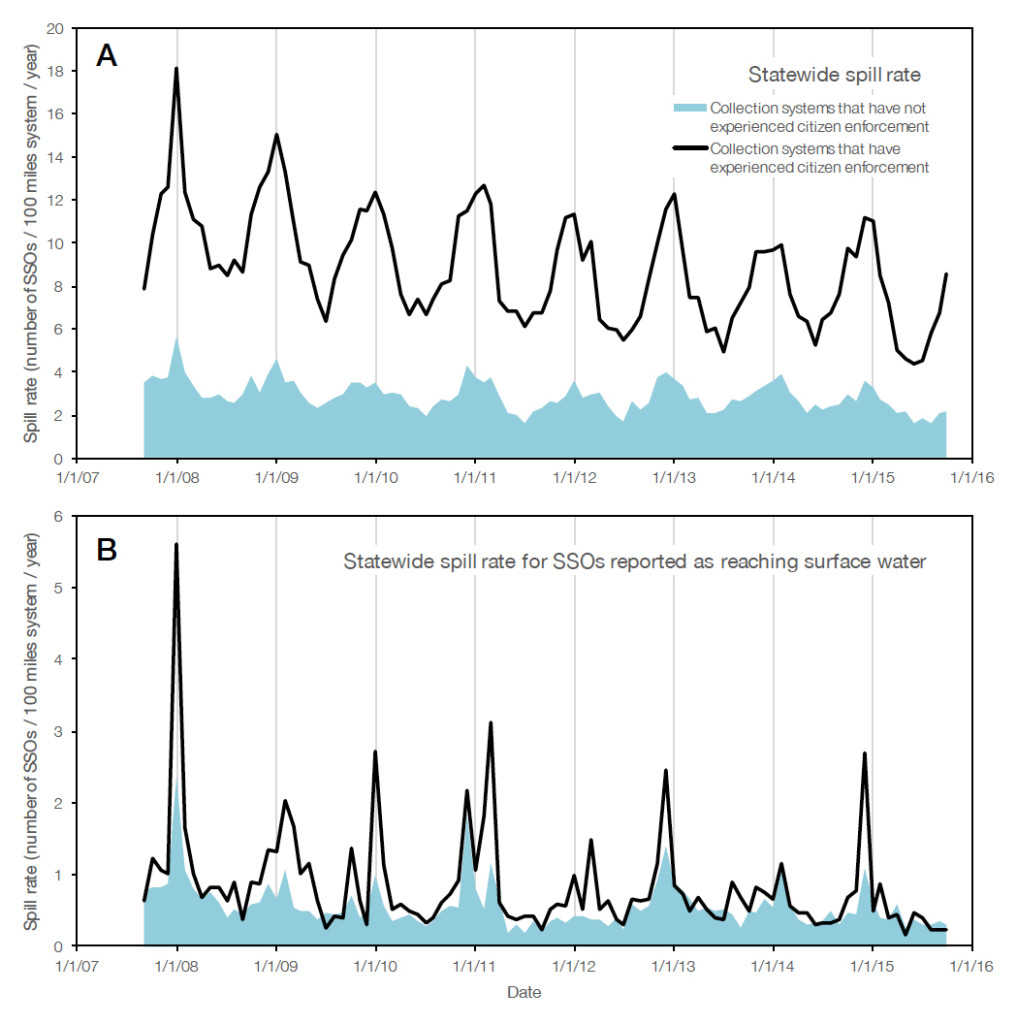
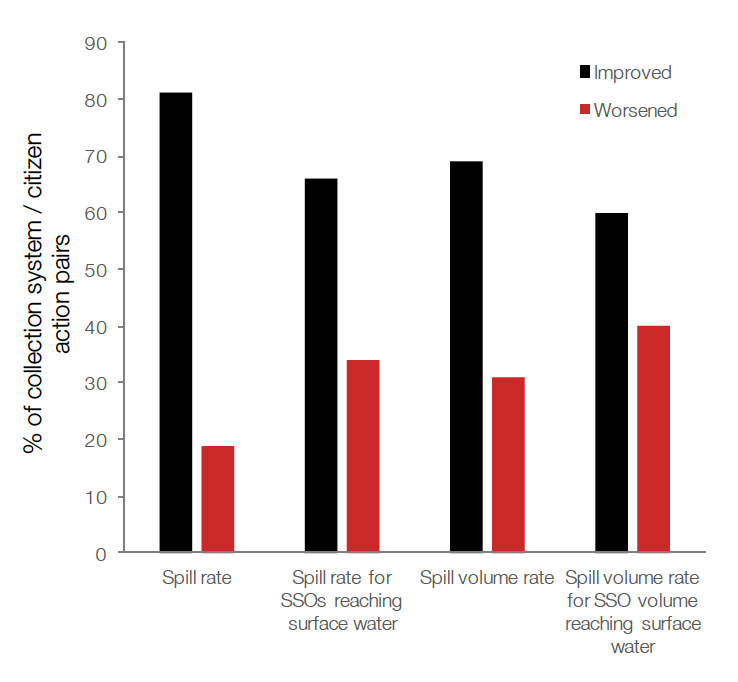
- There has been an increase in citizen enforcement activity related to SSOs over the past 2 decades, and especially over the past 8 years. (FIGURE 1)
- Citizen enforcement actions almost universally ended in settlement. Settlement agreements generally required collection system agencies to take actions consistent with improving collection system infrastructure, management, overflow response, and local water quality. We were not able to determine to what extent settlement terms represented new commitments or were the most efficient means of improving system management or performance.
- In contrast with citizen actions, most government enforcement actions related to SSOs sought penalties only. Although penalties may deter future violations, the infrastructure and management changes required by citizen enforcement settlements seem more likely to directly contribute to system improvement.
- Most citizen enforcement actions did not appear to duplicate government enforcement efforts, although in some cases there was significant overlap.
- Citizen enforcement was correlated with a variety of factors, including larger reported numbers and volumes of SSOs, higher spill rate and spill volume rate, and certain collection system characteristics.
- On average, over the past 8 years, collection systems throughout the state progressively reduced the number of SSOs they reported and, therefore, their spill rates. However, as a group, collection systems that experienced citizen enforcement showed greater improvements during that time. (FIGURE 2) Regional and individual performance trends varied greatly, suggesting that statewide trends should be interpreted with caution.
- The majority, but not all, of the collection systems that experienced citizen enforcement showed improved performance (in the form of reduced spill rate and spill volume rate) during the period after initiation of citizen enforcement action. (FIGURE 3)
Unresolved questions
Our findings are consistent with a hypothesis that, overall, citizen enforcement related to SSOs has been helpful in improving the performance of California’s collection systems and, by proxy, water quality. We do not, however, claim to have proven that hypothesis. Our data and methods do not allow us to tell whether citizen enforcement has actually contributed to performance improvements or is simply correlated with them.
Many factors beyond citizen enforcement might plausibly be driving (or contributing to) improved sewer system performance. New statewide requirements for sanitary sewer system management, planning, and SSO reporting that took effect in 2007 have likely been a significant driver of improvement. Furthermore, the collection systems likely to realize larger performance gains through compliance with those requirements are the ones that had worse baseline performance — precisely the systems more likely to be targeted by citizen enforcers. We don’t have enough information to determine whether or to what extent changes in the performance of systems subject to citizen enforcement were driven by state regulation, citizen enforcement, government enforcement, voluntary measures, or other factors. The details of each particular case matter, and substantial contextual information may be required to form a complete picture.
Moving forward: An opportunity for productive dialogue
Ultimately, there is no black-and-white answer to whether citizen enforcement is appropriate and effective. That is a policy question that involves a series of value-based judgments. However, we hope the results of our work can inform a productive dialogue between stakeholders with starkly different viewpoints about when citizen enforcement is appropriate and the directions future policy improvements should take.
Reader Comments
2 Replies to “Of sewage spills and citizen suits”
Comments are closed.





Thanks for the excellent insight. I wrote my student law review comment on SSOs years ago (http://papers.ssrn.com/sol3/papers.cfm?abstract_id=1911354). I think this continues to be a seriously under-recognized problem. The data you collected will be extremely useful in understanding its extent and impact.
Holly said;
“….Many factors beyond citizen enforcement might plausibly be driving (or contributing to) improved sewer system performance….”
Dear Holly,
Your analysis reminds us of climate change enforcement. Recently there has been legal action to investigate and prosecute corporations for allegedly violating the law by mishandling and withholding data on climate research. Also, there seems to be a pressing need for both government and citizen enforcement actions to arrest and incarcerate dangerous “deniers” who maliciously mislead the public.
We deniers deny in good faith based on truth, facts and evidence, this principle is upheld by the worldwide college of deniers. We shall not be intimidated, we shall not back down, we shall continue to deny both now and forever until truth is triumphant. As freedom loving Americans we shall never be restrained in the free exercise of our rights under the U.S. Constitution.
Let us acknowledge and espouse: Climate change is over-hyped, exaggerated and distorted, it is neither a tangible nor credible threat to the continued existence of humanity. Deniers rule with integrity and righteousness.